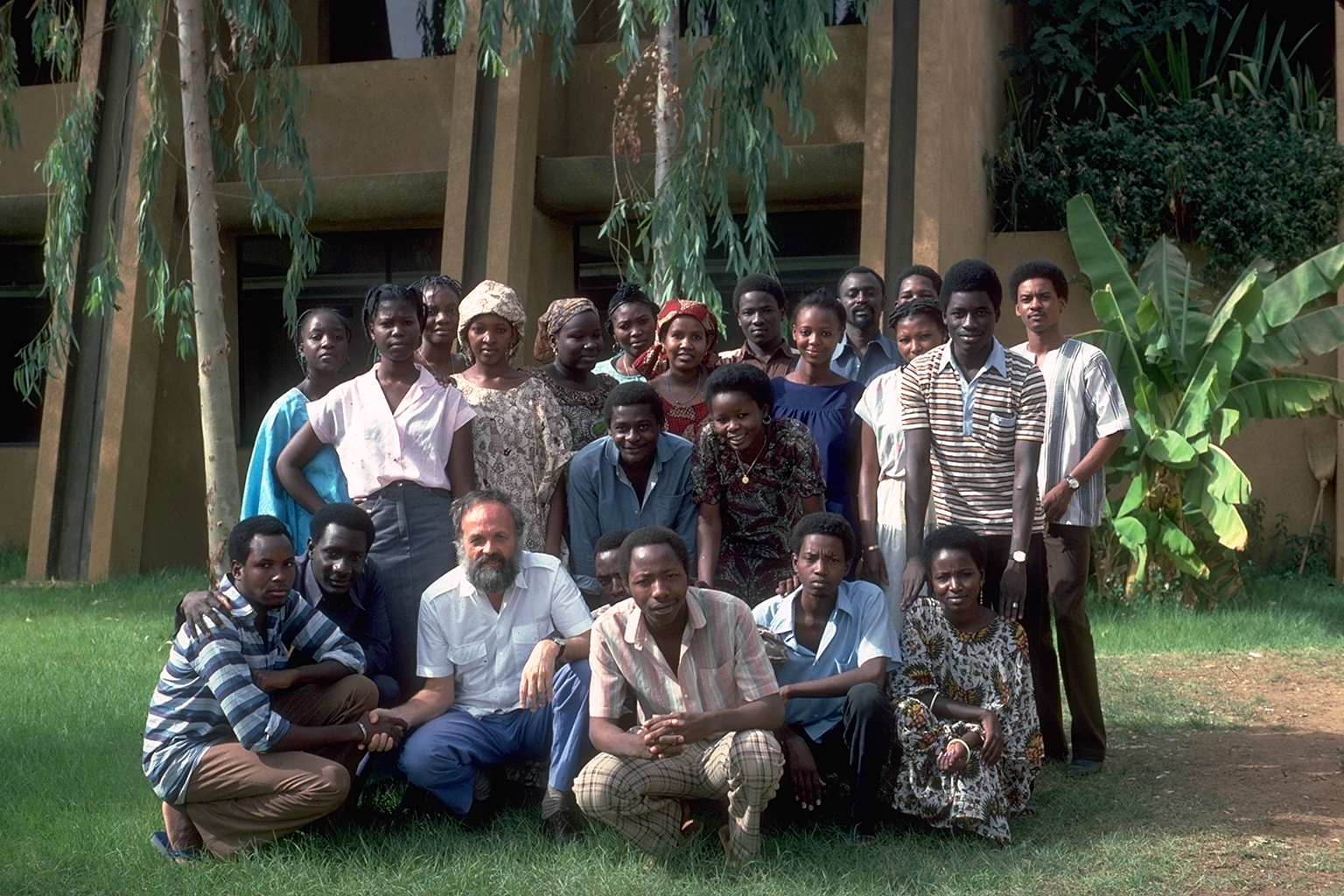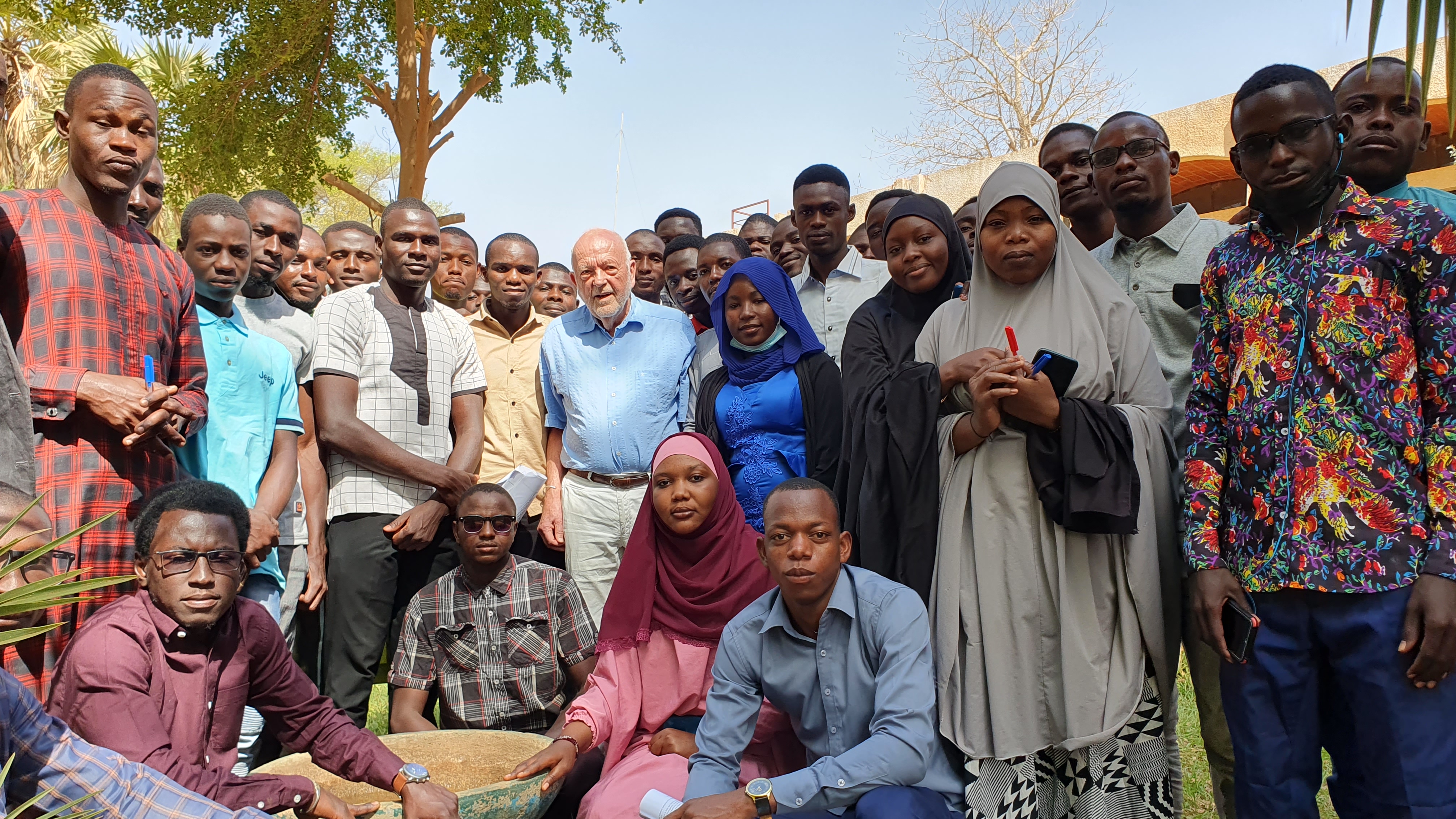News
"You cannot simply reduce Africa to a colonised continent”: A Conversation with Prof. em. Dr. Gerd Spittler
02.05.2024
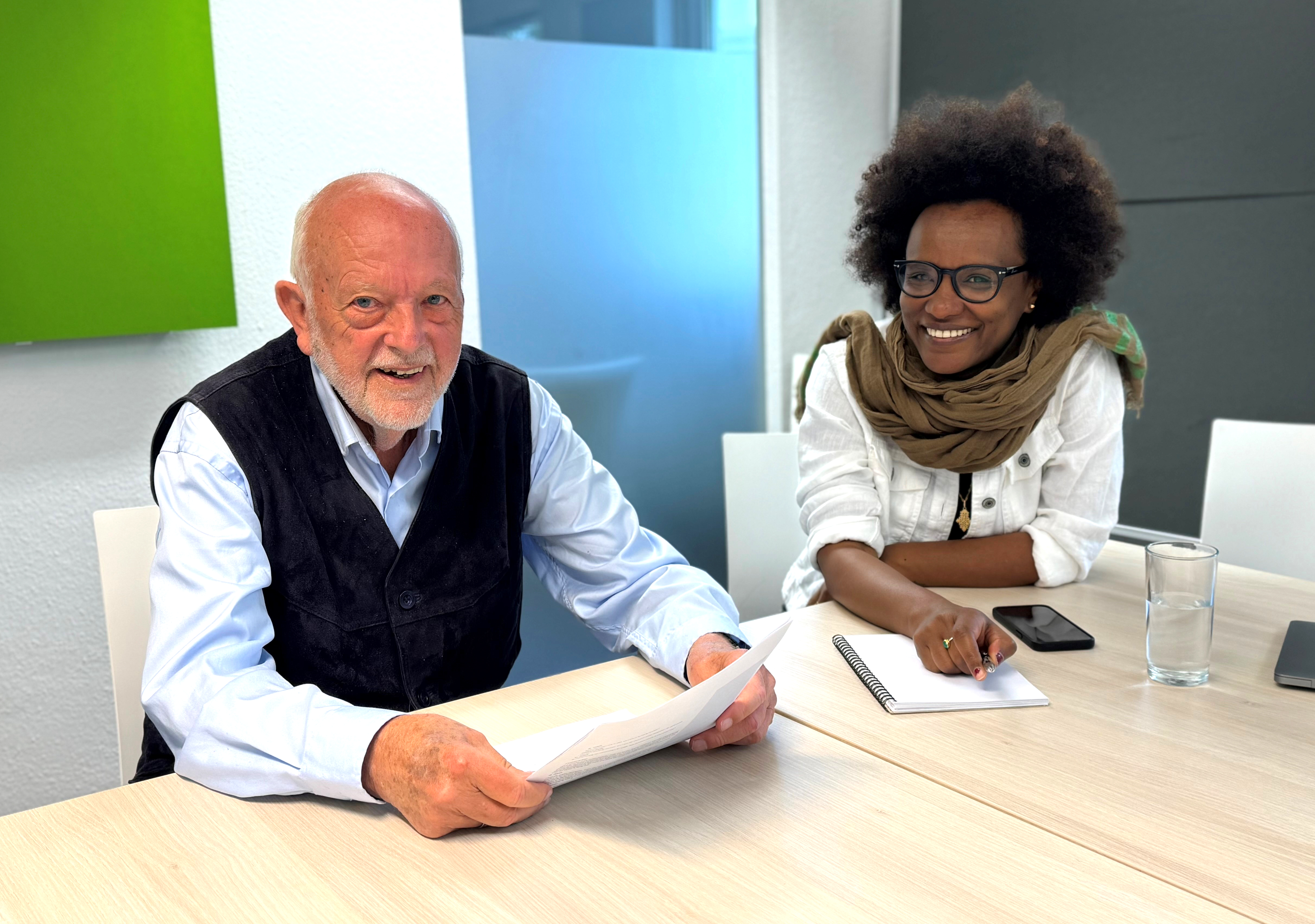
Prof. em. Dr. Gerd Spittler in conversation with the Cluster's Junior Research Group Leader Dr. Serawit Debele
In this conversation that took place on 23 November 2023 Prof. em. Dr. Gerd Spittler and Dr. Serawit Debele (both members of the Africa Multiple Cluster of Excellence) exchange their thoughts on the history of African Studies in Germany and the professor’s roles in its development particularly in Bayreuth, now one of the largest African Studies Centers in Europe advancing the agenda of reconfiguring African Studies.
The conversation revolves around the state of African studies/ research on Africa in the 1980s when Prof. Spittler moved to Bayreuth, his contributions, and his views on current debates around African studies. We also spoke about the debates on decolonisation, the relationship between Anthropology and African Studies and the idea that African Studies is an umbrella that brings various disciplines under it.This conversation is part of the documentation work we are doing in our Volkswagen foundation-funded project on “German African Studies through the lens of CRT”. The conversation has been edited to fit for this publication. I am indebted to Zernila Zaheer who transcribed the interview and Dr. Linda Besigiroha’s rigorous and meticulous editorial work to make it an enjoyable read.
Dr. Serawit Debele - Junior Research Group Leader
Dr. Serawit Debele (SD): Thank you for taking the time to speak to me, Professor Spittler. I guess we could begin with your time in Bayreuth.
Professor em Dr. Gerd Spittler (GS): On why I came to Bayreuth? Well, formerly this decision was up to the Wissenschaftsrat [The German Science and Humanities Council]. It is an institution which makes fundamental decisions about the development of higher education in Germany. They decided to establish African Studies at the newly founded University of Bayreuth.
Every professor who came to Bayreuth was not forced to, but it was the Ministry of Higher Education in Munich that recommended that he/she should do research in Africa. Here in Bayreuth, there were many who joined during the founding times of the university – anthropologists, geographers, historians, economists, literature, we even had natural sciences. I came to Bayreuth for such a reason. Moreover, I had the impression that I was more of an anthropologist than a sociologist. Another reason was that I wanted to specialise in Africa, however in Freiburg, you had nobody to exchange with. That was the main attraction of Bayreuth for me not necessarily the city itself or anything. Well, my wife and I became accustomed to it. We liked the landscape, and we remained here after my retirement. I did not go back to Freiburg.
SD: So, you came to Bayreuth thinking, ‘I am done with sociology. I want to explore my Anthropology passion.’ Why did Africa matter to you?
GS: I grew up in the Black Forest in a small town, and every year a missionary came and showed us photos from Africa. It was his pictures; I had no interest in becoming a missionary. I cannot pinpoint the moment but since then, I liked Africa. I had never seen any African until this point so the reasons may even seem irrational, but my motivation for doing African Studies was not because I wanted to help Africa. That was not it. I found and I find it very fascinating.The diversity in Africa is greater than on any other continent, the diversity of languages, but also of cultures. Africa fascinates me in many ways, and you cannot simply reduce it to a colonised continent.
SD: Were there already some Africa-related activities because of this before you came here in 1988?
GS: Yes, the first 'Sonderforschungsbereich' or Collaborative Research Center (“Identität in Afrika”) had been initiated by Professor Ruppert in 1984. I came in 1988. Before, I was one of the evaluators for starting this project and got to know more about Bayreuth in the process.
SD: What happened after 1988?
GS: You are talking about changes and continuities now. I was very engaged in institutionalising African Studies. In 1990 I initiated a Graduierten Kolleg, a graduate school, and later on the second Collaborative Research Centre (Sonderforschungsbereich), ‘Local Action in the Context of Globalization’ which started in 2000. I was also active in founding the ‘Kultur und Gesellschaft Afrikas’ [Culture and Societies of Africa] degrees at bachelor, and later master’s level. This was in 2000, together with Dieter Neubert who was a sociologist here.
I was engaged in these issues, but first BIGSAS, and later the Cluster, were integrating more African scholars. When I founded the first graduate school, there were only three Africans among the 20 PhD students. Well, one of the reasons was language – it was in German. With BIGSAS the majority comes from outside Germany and at least half of the students are from Africa, and this has really been a bigtime change. And now, even more with the Cluster, where you have four African partner universities.
Every German university says, ‘We want to do research with Africa and not only about Africa’, but how is it realised in practice? And I really think it is largely being realised here in Bayreuth because African scholars and partners have a voice in the decisions, and they have money from the Cluster. This is different.
However, I'm not happy about the fact, I have to say, that everything is in English.To me, this is also a kind of cultural imperialism. Are you familiar with AEGIS, The Association of African Studies centres in Europe? Today, as in any international association, the conference language is English. At the beginning it was different. It was founded in Bordeaux. Here, we took a very good decision and said you can speak in French, you can speak in English, you can speak in Portuguese, you can speak in German. The only condition is you should not speak in your own language.
SD: That's a challenge.
GS: Yes, it was a challenge, especially for English speakers because they are not used to learning other languages.
SD: That's true. So you feel like the English language is dominating.
GS: Yes, of course. If you have a conference, the language is English if you have only one English native speaker and even if there is no English native speaker.
SD: We are still talking about your role and your contributions.
GS: Yes, my contribution in Bayreuth in particular. As I told you, I was first professor of sociology in Freiburg. When I moved to Bayreuth, I got the Chair of Social Anthropology. As a sociologist I was doing decolonization studies before everybody knew what it was, especially in anthropology. In 1979, there was a big two-volume work with several thousand pages, Die Völker Afrikas und ihre traditionellen Kulturen [The Peoples of Africa and their Traditional Cultures]. Colonialism or the colonial state was not mentioned in this book. It was only about tradition.1981, at about the same time, I wrote a book about colonial French West Africa (Verwaltung in einem afrikanischen Bauernstaat. Das koloniale Französisch Westafrika 1919–1939) where I criticised and analysed the colonial state. In 1980, I also wrote an article ”Streitregelung im Schatten des Leviathan” (Dispute Settlement in the Shadow of Leviathan) , where I analysed dispute settlement in Africa in the context of the colonial state. This contribution was much discussed, more among lawyers, sociologists and historians than among anthropologists. 40 years later Judith Beyer and Felix Girke published “The State of Custom: Gerd Spittler’s dispute Settlement in the Shadow of Leviathan today” (2021).
At that time in Germany, anthropology meant studying traditional cultures. Today, if you told an anthropologist that he studies traditional culture, he would feel insulted because everybody wants to be modern. In a recently published autobiographical article “Mein Weg von der Soziologie zur Ethnologie” (2023) I said my contribution to modernity and analysing coloniality was as a sociologist. Now, I have become, perhaps, one of the few anthropologists who is still interested in traditional culture, to put it a bit cheekily. For example, I don’t know if you have seen my work published last year.
SD: Yes, I have, Leben mit wenigen Dingen (2023). So many beautiful pictures.
GS: Yes, everybody mentions the pictures, but for me, the text is important too. I counted things in every household and found that, on average, a Tuareg possesses 130 things. When I did the same research with my German students, every student had 3100 items on average. And the question arises, how do you live with 130 things? My thesis is, this is not just about poverty, saying that the Tuareg are too poor to have many things – They lead another lifestyle, and it is in such questions that I am interested.
I have also studied ‘work ’for many years. Work among peasants, like the Hausa peasants, among Tuareg goat herders and camel herders. I compared it to work in Germany, to industrial work and post-industrial work. My interest was to compare it but not to compare it in the form of a dichotomy – here you have modern work, here you have tradition. I found that there are many things among hunters and gatherers, among peasants, among nomads, that are very interesting to understand in terms of modern work. I didn't study migrants. I studied peasants or nomads for their own sake, whereas for anthropologists today, a peasant is only interesting if he becomes a refugee or migrant to Europe.
Tuareg Students in Niamey preparing a video for the exposition: tying a turban – © Gerd Spittler (click to enlarge)
SD: Or the cities within Africa. During the foundation of BIGSAS, did you have a broader research focus to be more accommodative?
GS: I was not involved in the foundation of BIGSAS. This was Ibriszimow (Prof. Dr. Dymitr Ibriszimow, Afrikanistik). I supervised some doctoral students and once acted as ombudsman of BIGSAS in case of conflicts, but I was not amongst the founders.
SD: Following up on your point about decolonisation, you said you started doing that kind of work way before it became ‘fashionable’.
GS: Yes, my sociological studies all concerned the colonial state. Now, I'm more interested in other topics. What I would criticise in the present decolonization movement, not only with regards to Bayreuth but elsewhere, is the politicisation of it. I know that it is an important question, but it is not the only interesting question when studying Africa. Africa is much richer than the heritage of colonialism.
SD: This is also related to the question of knowledge production and who does the work. In talking about how things evolved, you mentioned being able to involve African students and African colleagues as one of the major changes over the years. What do you think about these changes?

Fieldwork in Timia: Prof. Spittler listens to a lecture of Limam Alhaji Salikhu (1984) – © Gerd Spittler (click to enlarge)
GS: I myself, I have not experienced this, but I have heard of other cases where there is a tendency sometimes, in some circles in South Africa or in the French-speaking area like in Senegal, to think that the European has no experience of slavery and of colonisation, so he cannot really do that research. I have not met anybody yet here in Bayreuth among the African scholars who says Europeans have no place there. However, I know from colleagues in the Cluster, who have had this experience, not in Bayreuth, but in London, for example, and one in the United States as well. I would disagree here. My research is based on participant observation. I have lived many years among the Tuareg and among the Hausa as well. I speak their language. During my participant observation, I corrected many of my pre-established ideas. If an African from Senegal comes and tells me that what I am saying about the Tuareg is wrong, he must prove it. I would not agree simply because he is from Africa.
SD: So it should not be about whether one is black or not, but about ‘what the facts say’.
GS: Yes, the facts. Of course, I completely agree that African Studies at the moment of independence was completely in the hands of especially French and British scholars, and that had to be changed. In Germany, if you do German studies, most of the scholars in sociology or in history are Germans, but you have a very strong presence, especially in history of British, English, and American scholars who are studying German history, and for me, it is very important to have these different perspectives.
SD: This brings us to another question as well; to the idea of area studies, African Studies, the question of disciplines, right? What would you propose to make this work instead of having this ‘friction’ where the non-African scholars feel pushed away? How, then, do we rethink knowledge production?
GS: I came to Bayreuth because I wanted to have this interdisciplinary contact with geographers, with literature, with religious studies and other disciplines, and I'm very happy that we have this experience here.
While doing my research, I lived with the people on the ground for many years and not with academics in Niamey. In an autobiographical article which has just been published (“Mein Weg von der Soziologie zur Ethnologie”, in Paideuma 69, 2023), you will get a sense of this, that while I discuss many social scientists, many anthropologists, finally, I give my thanks to the people I had lived and worked with. None of them had seen the inside of school, none of them spoke French. This was a completely different perspective and I learnt so much from it.
Of course we try our best, and perhaps, I did not do enough to work with other Africans on the same level, not as informants, or not as collaborators who are doing interviews. This may have to do with a special situation in Niger. Niger, or the French speaking colonies were much less educated than the English ones and the interior countries of French West Africa like Niger and Mali even less so. When I started my research in 1967 there were very few African sociologists and anthropologists I could work with. Now it is completely different. I was active in changing this. Of the many students I taught in Niamey, there are six who finished or are currently finishing their PhD in Bayreuth. I also teach in Africa regularly. Even now, in January, I will go to Niger. I’m interested in not only the students who come here to do their doctorate but the problems of the students there. I like teaching there.
SD: This is quite interesting. You are talking about the many layers to doing research on the continent. How are we engaging in conversation with each other? I just want to understand how this plays out, for example, in your teaching here in Bayreuth. When it comes to assigning literature for your class, what were the dominant readings? Were you consciously bringing in scholarships by Africans? Or inviting African scholars to give a lecture? How do you perceive that engagement?
GS: I did this more in Sousse than in Niamey. Not in the summer school where I taught, but more so in my regular teaching week. There, I realised that the Tunisians don't see themselves as Africans. You might have experienced this. This was a great merit of my months in Sousse to get this anthropological awareness. I did one of my courses there on ‘What is Africa?’, on different views of Africa. What was interesting for Sousse is that in Roman times, the name Africa referred to Tunisia. This area that is now Tunisia was Africa. Do you know Ali Mazrui’s television series and his book The Africans. A Triple Heritage (1986)? In it, I found a really good book with studies on the European influence and on the African and Arab influence. I discussed this book with students, and we also did a conference in Sousse where colleagues from Bayreuth, and from Niamey were invited to pitch in. I greatly appreciate this structure in the Cluster: African partners, who have a lot to say in the Cluster, who can determine, even though the money comes from here, what they are doing with it themselves. Such an approach is unique, especially in Germany. It is a very good thing.
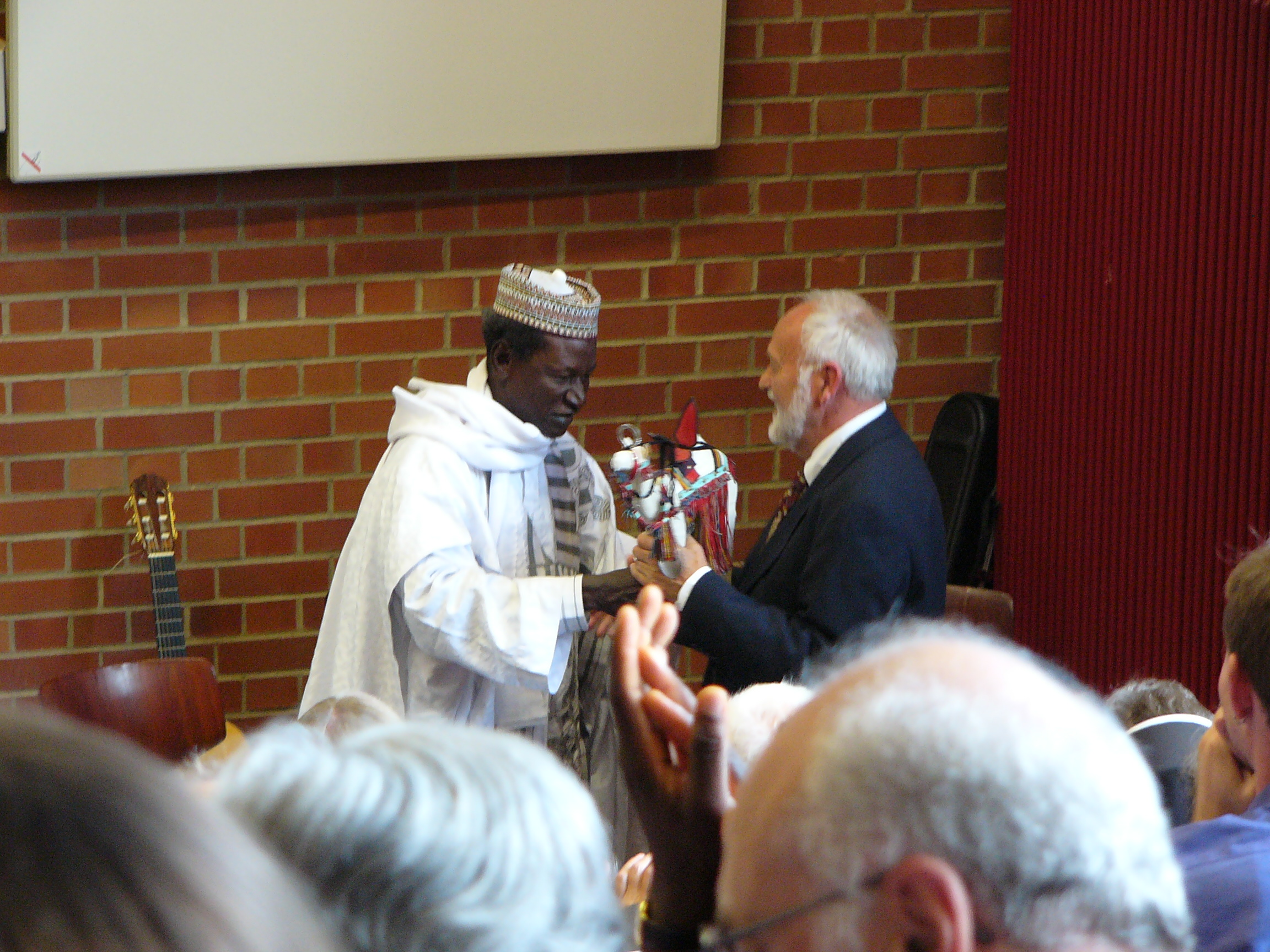
Aboubacar Adamou, dean of the faculty of humanities at the university of Niamey, presents a camel as a gift during the farewell party for Prof. Spittler in Bayreuth (2004) – © Gerd Spittler (click to enlarge)
You asked me about inviting African scholars to give a lecture. Yes, as long as I was active in the University I invited nearly every year (through the Institute for African Studies, or the SFB, or the Humboldt Foundation) African colleagues, mostly from Niger, to give lectures. Sometimes we organized a joint seminar. At the same time they could meet other colleagues here and profit from the University library.
SD: I would like to follow up on your view of current debates about decolonisation and who should do research when it comes to Africa. There is a vibrant scholarship coming from the diaspora, and it is very much present in knowledge production in African Studies. Does their presence in the North make a difference in terms of the ‘friction’ that we're talking about?
GS: I do not want to give a general statement about the diaspora Africans, but I very much admire the African intellectuals who stay in Africa. Someone I know is Muhammad Sani who is in religious studies and did his PhD in Chicago, said ‘No, I cannot do it from outside. I must go back.' Mamadou Diawara did his habilitation with me and is now in Frankfurt. He initiated a very interesting platform called Point Sud. You are also aware of Elísio Macamo, who is also from the Bayreuth scene. They have a project together called PAPA (Pilot African Postgraduate Academy) and it caters to young African scholars staying in Africa. It is a prerequisite to be based in an African university, both in French and English-speaking West Africa. The three-year project is financed by the Gerda Henkel-Stiftung. They come to Bamako, or to other places where Point Sud is involved, to discuss general problems of African Studies. These are all scholars who stayed in Africa, and I also know of some who decided they could easily make a career in Europe or in the United States, yet decided to stay in Africa, or who say that one gains a different view on things if you stay in Africa.
SD: Staying on the diaspora question, and this is related specifically to our project, there is also a question of race. I recall one of your contributions to an edited volume in 1984: Die Sahara: Mensch und Natur in der größten Wüste der Erde. You have a chapter entitled, ‘Warum sind die Kel Ewey Tuareg so Schwarz.’ It is short but curious, I find.
GS: Yes, the Tuareg are fascinating. In a sense, this is part of colonial politics. So, the French referred to the Tuareg and Arabs as ‘white Africa’. I read a lot of travel writing from the 19th century, and in one case, I realized that the chief of the Kel Ewey Tuareg ridiculed a British traveller because he was so white and he said it was so ugly to be one, and with that nose and all that.
The Kel Ewey are quite black. There was an institution in Tuareg society in pre-colonial times, and in Hausa society as well, where you could marry a slave not just have one as a concubine. This was called tewahey. The children were then born free, and many Tuareg preferred to marry slaves instead of free Tuareg women. The Kel Ewey Tuareg are not matriarchal, but they are matrilocal and matrilinear, so, marrying a Tuareg woman meant having limited say as a man, to put it simply. However, I did not go into details in my research among the Kel Ewey because it’s a thorny matter.
SD: Why? Is it a thorny question for the community too?
GS: Because you don't want to be of slave descent.
SD: So, there's a stereotype attached to it.
GS: Yes, but at that time it was perhaps influenced by French racism. The way this chief of the Kel Ewey ridiculed the traveller because he was so white and blond; he found it very ugly. Yet now, and this is perhaps the result of French colonialism, the whiter you are the more beautiful.
SD: In thinking about the question of race in this context, two things come up. The first is, why was the more critical side of anthropology not so interested in the question of race in Africa? Obviously, what you were describing now is a very good example of studying race. Yet anthropology has only marginally, if at all, been interested in race in the study of Africa. Why do you think is this? And why was it not interesting for you personally, for example, to explore the question even if you had had these encounters?
GS: Well, for me it was too sensitive.
SD: Even at the time in the 60s and 70s?
GS: Yes, to really study and find out about which families are from this or that origin, I could not do that. However, race was studied. What is referred to as anthropology in Germany has nothing to do with ethnology or what we call social or cultural anthropology. The word Rassenkunde, that is, to study races, was reserved for them. These were biologists.
SD: Is this the social evolution school?
GS: Precisely. And this is what was called anthropology in Germany. It has become possible to use the term differently since some years now (for example in my book Anthropologie der Arbeit (2016). Now anthropology means quite another thing in Germany. In 2017 the Deutsche Gesellschaft for Völkerkunde changed its name to Deutsche Gesellschaft für Sozial- und Kulturanthropologie (DGSKA).
SD: Where does German anthropology or ethnology stand in relation to this debate on Anthropology being in the service of colonialism?
GS: After the First World War Germany had no longer colonies. Fieldwork did not become the basic method as in the British tradition. But the discussion about colonies continued. During the Nazi Regime some ethnologists emigrated. However, many ethnologists supported the Nazi regime. During the last years many publications have revealed the involvement of ethnologists with the Nazi regime. You can find a good description of this development on the homepage of DGSKA.
SD: What does African Studies mean to you?
GS: Well, coming from sociology, I was never limited to Africa. For example, I wrote an article about Prussia in the 18th century where I had the thesis that the Prussian State was peasant style like French West Africa in the 20th century, and you can make useful comparisons. I did peasant studies for quite a while and peasant studies were much more influenced by studies in South America or in Asia also.
In this sense I was always interested in theoretical questions that were never limited to Africa, but I found it useful that I came to Bayreuth because of having this interdisciplinary situation. Well, traditionally, Africa was the domain of anthropology in Germany, that is, Völkerkunde, ethnology and geography. We had no history, no literature, and so on. I found it very interesting in Bayreuth. This was the basis of the Graduiertenkolleg and of the Sonderforschungsbereich. There were many disciplines involved and I have learned a lot from this. I find Africa area studies useful in this sense. You have one continent, and you have different disciplines you can discuss. However, with regards to my theoretical work about peasants I also studied Prussia. It would be a great limitation if you only considered Africa even though it is useful to concentrate on one continent. It's more pragmatic. Concerning my theoretical approaches over many years, I did peasant studies where my research was in Niger among Hausa peasants, but most of my theoretically interesting articles are not based in or are not from Africa.
SD: Were you familiar with the debates of the time, or did you have any connections with the African Studies Association in the US back in the days? What were your impressions of these conversations?
GS: I did not attend any of the big conferences, but I do know the debates that come from ASA. For example, the discussion about the Herskovits prize and the changing of the name to the ASA Best Book Prize.
SD: Aspects of the ASA debates were about the representation of Africa and Africans. Were you not that interested in these questions?
GS: Well, I gave a course on it in Sousse: ‘What is the idea of Africa’ in Africa itself? If I should take a position, it is that of Ali Mazrui in his Television Series (first aired in 1986) and in his book, The Africans. A Triple Heritage.
SD: What about your role in VAD, were you a founding member?
GS: I was not a founding member, but I was the chairman of the Association for some years.
SD: By way of closing our conversation for today, how involved are you in the Cluster now?
GS: I am a member in the Cluster because I have this "Vorlass Projekt" (predeath bequest): organizing and digitizing my research material (photo, audio and notebooks). Despite my own reservations about some points with regard to the Cluster, in general, the Cluster’s idea of cooperation with Africa is very fascinating compared to when I came. Well, I did initiate the Graduierten Kolleg and a Sonderforschungsbereich, but there was much less cooperation with African scholars compared to what the Cluster is doing now.
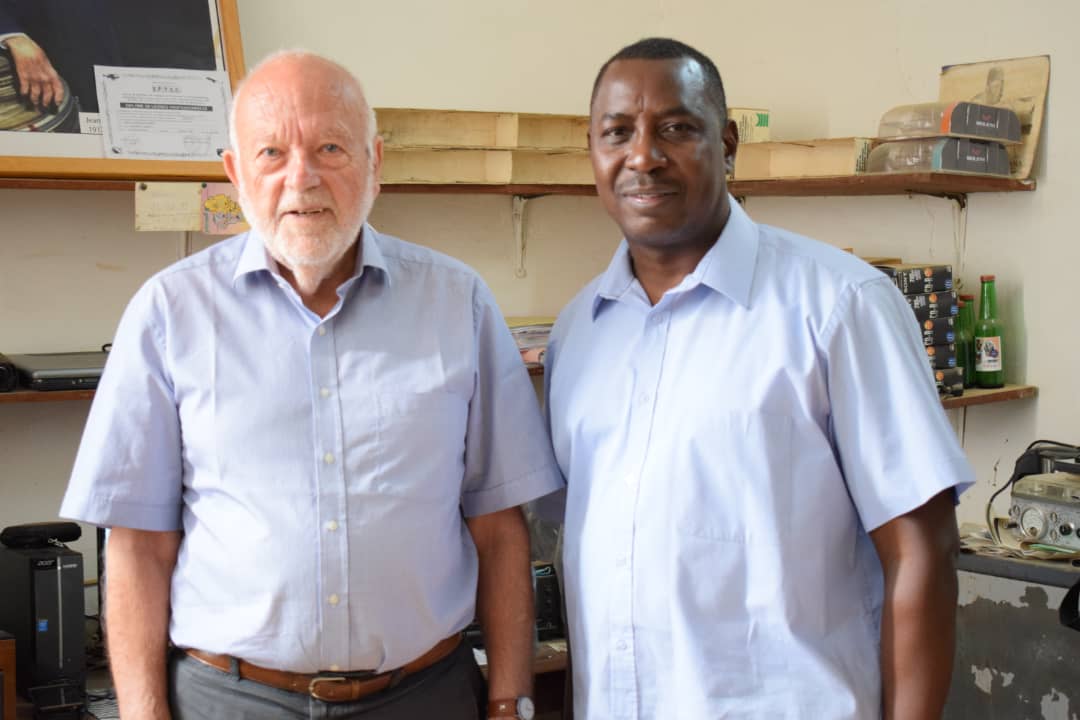
Prof. Spittler with Prof. Seyni Moumouni, former director of IRSH in Niamey (2020) – © Gerd Spittler (click to enlarge)
SD: I read the project description, and it says that it’s not just about making it available for German scholars, or for scholars based in Germany, but it will be available to colleagues on the continent. We're talking about quite some years of material. I think it will be wonderful for the coming generation to have access to the work that you did, and you have written about some of it. We look forward to engaging with it.
GS: Yes, it is for me very important that my visual, audio, and documentary data covering a period of nearly 60 years is accessible to Africans. This is the reason I am in permanent contact with IRSH (Institut de Recherches en Sciences Humaines) at the University of Niamey.
You have asked me a lot of questions and I don’t know what you think about it all. We should meet again to discuss this someday.


